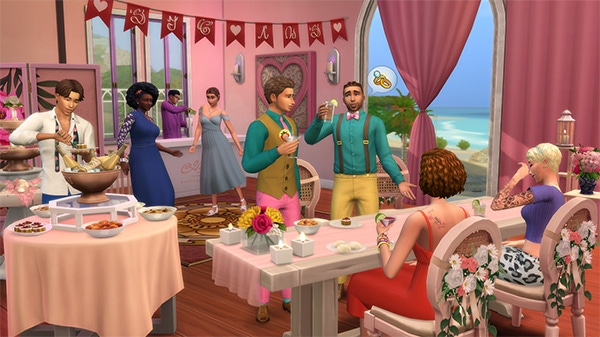Trending
Opinion: How will Project 2025 impact game developers?
The Heritage Foundation's manifesto for the possible next administration could do great harm to many, including large portions of the game development community.
Maxis is showing off new tools dedicated to letting players customize their Sims' pronouns in The Sims 4.

Today EA and Maxis fully unveiled a new set of in-game tools for The Sims 4 that will allow players to customize the pronouns of their Sims.
The new tools (created in partnership with LGBTQ orgs GLAAD and the It Gets Better Project) expand the game's character creation by allowing players to pick from three pre-established pronouns (they/them, she/her, or he/him), or create custom pronouns not covered by those three presets for each Sim players create. Those might include neopronouns like xe/xim or ze/zir, which have seen wider usage in the last decade.
The studio's efforts to roll out this new pronoun feature are notable both from a technical and cultural standpoint. Historically, gender expression in The Sims games has been limited to picking male or female characters, and many of the games' systems such as narration are layered on top of that.
That means it's taken a lot of work to integrate this system into an 8-year-old game.
It Gets Better Project gaming and tech coordinator Stephanie DeBiase explained to IGN that The Sims series has long been considered a safe fictional space to explore gender and sexual identity. For the last year, fans have been telling Maxis that the lack of pronoun customization felt limiting in fulfilling that fantasy.

Sim gender expression has been slightly customizable or some time, with clothing identity, body types, and other options being part of what players can customize. But limitations on pronoun usage still had negative effects for some players.
"If you’ve created a Sim and imagined them to use certain pronouns, and then see that characters in the game are using different pronouns to refer to them, it can be jarring, if not dysphoric, and take you out of the world you were trying to build," Debiase told IGN.
Maxis also offered a bit of insight on the process, explaining that complications with the English language can make it difficult to retroactively implement systems like this. The conjugation of the word "like" presents one challenge because if the verb applies to a single person using he/him or she/her pronouns, the sentence reads as "he likes" or "she likes."
If a person uses they/them pronouns, a sentence in-game would read as "they likes" rather than the correct "they like". Those variant uses can expand for players who use neopronouns.
Interestingly, Maxis associate producer John Faciane and executive producer Phill Ring also explained to IGN that they're taking to heart some advice from The It Gets Better Project, which is to be transparent and open to feedback as these new tools roll out to players. Developers are generally used to adapting to player feedback, but it's especially relevant when working with players who will make most use of features geared toward inclusion.
"There are going to be instances where maybe the tool that we've created needs to be edited manually," Faciane explained, and it appears that Maxis intends to make updates based on what players show the company on social media.
This update follows the recent release of The Sims 4: Wedding Stories, a wedding-themed expansion that prominently featured weddings for same-sex Sim relationships in its marketing. Before Russia's invasion of Ukraine (which saw EA shut down operations in the country), EA was grappling with whether it could legally release the expansion in Russia due to the country's laws against depicting same-sex relationships.
You May Also Like